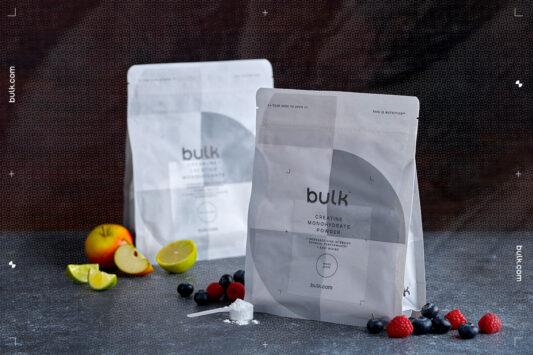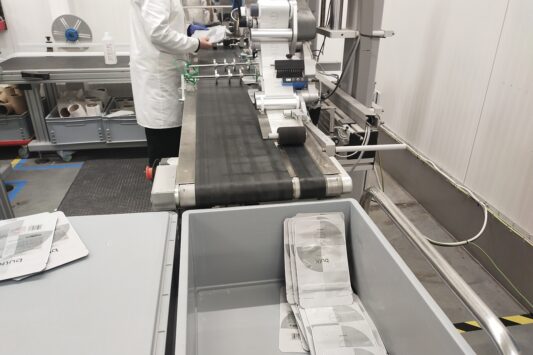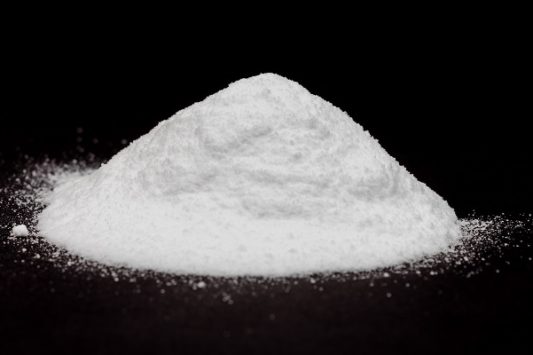One of the big marketing ploys for many supplements is to suggest that they are ‘clinically researched’, contain ‘clinically researched doses’ or have been scientifically ‘proven’ to be effective. The truth is something that may have been clinically researched, but that doesn’t mean that research showed it had any effect. The supplement in question may indeed have been clinically researched and ‘proven’ but the experiment may have been set up in a favourable way in order to try and make a supplement seem more effective than it is.
Whey Protein
Number 1 in our list is unsurprisingly the most popular-selling sports supplement year on year. Whey protein is a high-quality protein, which contains all our essential amino acids and has enough Leucine per 30g serving to promote muscle protein synthesis (MPS) [1]. Leucine is an important nutritional trigger of MPS and MPS is the process by which the body uses amino acids to create new muscle proteins, promoting recovery and muscle growth.
Combined with other quality sources of protein, such as meat, fish, dairy and eggs, whey protein is a cost-effective and easily digestible method of meeting daily protein allowances. Remember that this is the main factor to consider when looking to build muscle – as good as whey protein is, simply using a shake post-workout will not be enough and should be used in conjunction with other, whole food protein sources to meet your daily targets.
In this sense, whey is nothing ‘special’ with regards to being a protein source, but for those who struggle to reach their protein requirements, whey protein will be an efficient way to hit these targets and has been shown in several studies to promote muscle growth when used as a supplement both pre and post-workout [2, 3].
This rationale for a supplement providing what we may not be able to get solely from the diet also extends to carbohydrates and fats. In terms of carbohydrates, the use of fast-digesting carbs such as Dextrose, Vitargo and Highly Branched Cyclic Dextrin may not be essential if we are able to consume enough carbs in the diet for our goals. However, for those who need to refuel quickly after exercise (such as training/performing multiple times in the same day) then these can come in handy when consuming carbs in the amount required, as to get these solely from whole food sources can be challenging. These might also be useful for ‘hard gainers’ who struggle to put on muscle to bump up carb/calorie intake in an easy-to-digest form in and around their training.
Omega 3
Omega 3 is an essential fatty acid that is found in a dietary form as oily fish. In supplemental form, it is most commonly found as either a fish oil or omega-3 supplements. It is two types of omega-3 found in fish oils, EPA and DHA, which are important in the body and separate omega-3 found in fish from the types of omega-3 found in plant sources [4]. Although plant sources of omega-3 (ALA) can convert to EPA and DHA, this does not occur in significant amounts, so for those who don’t consume enough oily fish, omega-3/fish oil supplements at 2-3g per day are often recommended [5].
Omega-3 plays many important roles in the body, including controlling the inflammatory response, supporting the immune system, cellular signalling and cellular structural properties. It is unsurprising then that research into omega-3 supplementation is an area of interest not just for general health but also for optimisation of athletic performance [6].
Much like whey protein, if we consume enough in the diet it is not essential to supplement with. However, many people do not get close to the recommended amount for optimal health, so supplementation comes highly recommended.
Creatine
Next up in our list of effective supplements is creatine. Creatine is found in several supplemental forms but Creatine Monohydrate is the most widely researched and is shown to be consistently effective. Creatine works by providing increased fuel for our muscles during high intensity, anaerobic energy pathways, increasing the duration that we can sustain high demand work. This means more reps and the potential for more muscle growth.
The research consistently shows creatine to be of benefit in the development of strength and muscle mass, where training for these outcomes is reliant, in part, on the energy systems that rely on creatine [6]. However, some people may be non-responders, and this can be for a few reasons, but either they naturally have high creatine levels in the muscles which is also influenced by diet, or that they do not carry enough muscle for supplemental creatine to be stored in significant amounts to have an impact. Supplementation with around 5g of creatine will saturate the muscles fully in less than a few weeks, but for those looking to get the benefits quicker than consuming 15-20g of creatine per day, split evenly throughout the day, will saturate the muscles in just a few days.
Vitamin D
Vitamin D is something that under the right conditions we don’t need to supplement in the body as it can be produced naturally with the help of a little bit of exposure to UV rays. Unfortunately, living far north of the equator, in the winter months we do not get enough vitamin D and many people are below their requirements for optimal health.
Vitamin D is essential for many functions in the body, including normal hormonal function, immune function and bone formation and maintenance – all of which can have an impact on performance in athletes or those who train regularly [7].
Supplementation is recommended especially during the autumn and winter months but can be safely used all year with doses of Vitamin D3 at around 2000IU often suggested to maintain optimal levels [8].
Caffeine
Caffeine is famous for being the world’s favourite drug. Caffeine has shown some amazing benefits in terms of alleviating fatigue, boosting performance and even having short-term weight loss benefits [9].
Caffeine exerts many of these effects by stimulating the release of adrenaline, the ‘fight or flight’ hormone, which gets the body ready for action. Caffeine has shown benefits to performance across many sports, from endurance to strength-based sports [9]. It is for this reason that caffeine is an important component in our pre-workout formulations including ELEVATE™, ELEVATE™ ZERO PRE WORKOUT and Complete Pre-Workout™.
These also contain other ingredients that have a solid amount of research backing such as Beta-Alanine, which has shown some positive effects in improving performance by acting to ‘buffer’ lactic acid accumulated during intense exercise, thus improving performance and Acetyl-L-Carnitine which can improve cognitive function and may have some benefits for performance by increasing the body’s ability to use fat as a fuel, sparing muscle glycogen for when we really need it.
In summary, within the supplements industry companies are always looking for the next big thing when it comes to performance, muscle gain or weight loss. Unfortunately, these often fall short of expectations. However, there are an array of supplements that have now been around for a while, which can help support a healthy balanced diet and have been tried and tested to boost performance advantage if used correctly.
Related articles
Eager to learn more? We believe that every person, with support, has the right to transform their lives through fitness. That’s why we’ve put together hundreds of articles with expert advice, all to help you on your fitness journey. From building muscle mass to the best vitamins for tiredness, check out our relevant articles below:
Alcohol and muscle growth Deadlifts hurting lower back
Exercises for elbow pain Supplements that help with sleep
Benefits of Cod Liver Oil Vitamins for energy and tiredness
Best Vitamins for tiredness Guide to building muscle mass
How to stop hip pain when squatting Best supplements for muscle growth
















